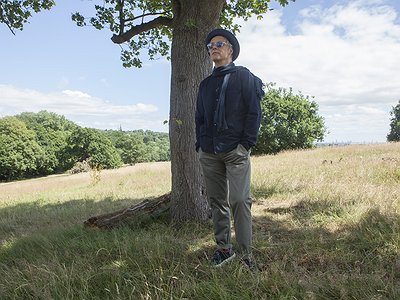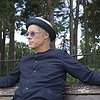Part 2
Could you take us through a day in your life, from a possible morning routine through to your work? Do you have a fixed schedule? How do music and other aspects of your life feed back into each other - do you separate them or instead try to make them blend seamlessly?
I don’t have a fixed schedule, and every day is slightly different, mainly because I combine my musical work with writing, editing and teaching at a couple of universities. Just about everything I do is essentially musical in nature, so there are many overlaps. I find that writing text is usually an early morning activity, while musical composition often comes late at night, although studio work is a daytime activity for me, these days (it wasn’t always thus…). In between there is often teaching and, of course, there are always many chores!
Could you describe your creative process on the basis of a piece or album that's particularly dear to you, please? Where did the ideas come from, how were they transformed in your mind, what did you start with and how do you refine these beginnings into the finished work of art?
The first track I wrote and recorded for my solo album, Vertical Land, is called ‘A Thumbnail Sketch of Infinity’, it was inspired by some travels I’d undertaken in mountainous regions of southern Europe, Scandinavia and Africa. It began in a very instinctual way by me hammering out drones on a three-stringed mountain dulcimer (the name was significant) – I was literally trying to translate the feeling of primal awe I’d experienced in these places in the most direct musical way possible. I built up the track from there – it has quite a lot of layers including tuned percussion, pianos, woodwinds, electronic processing and so on – and I think it succeeds in capturing and refining this almost primeval quality and awestruck mood, while being a rhythmically intricate, structurally dynamic and melodically rich piece of music. It works for me, anyway!
There are many descriptions of the ideal state of mind for being creative. What is it like for you? What supports this ideal state of mind and what are distractions? Are there strategies to enter into this state more easily?
I’m not sure there is such a thing as an ‘ideal state of mind’ for creativity. I love the notion of meticulously preparing for the creative moment in a monkish, Zen-like way, but it doesn’t really work like that for me. I sometimes get an excellent idea while riding my bike in the middle of heavy London traffic, or a melodic line that comes to define a piece will arrive only because I’m too tired and the written line is played incorrectly, but somehow the ‘wrong’ notes just work ... ‘Luck is being ready’, as Brian Eno has it.
How is playing live and writing music in the studio connected? What do you achieve and draw from each experience personally? How do you see the relationship between improvisation and composition in this regard?
It’s very hard for me to translate what I do in the studio to the stage – unless I have a budget for a dozen musicians or more. I’m usually playing several overdubbed instruments simultaneously, and my music is often composed from innumerable interlocking layers. It’s an issue I’m addressing right now as we try and find a way to get a Snow Palms live show together for next year. Wish me luck!
How do you see the relationship between the 'sound' aspects of music and the 'composition' aspects? How do you work with sound and timbre to meet certain production ideas and in which way can certain sounds already take on compositional qualities?
A lot of my music is literally made in the moment, in the studio – there’s a lot of spontaneity and instinctual gesture involved – so composition and sonic identity are very closely bound together for me. Choosing a particular instrument, or treatment of an instrument, for a particular part is already a major ‘production choice’ for me.
Our sense of hearing shares intriguing connections to other senses. From your experience, what are some of the most inspiring overlaps between different senses - and what do they tell us about the way our senses work? What happens to sound at its outermost borders?
I have a kind of mild form of synesthesia, whereby I actually ‘see’ music in a palate of distinctive colours – this actually helps me to compose. Those ‘sublime starburst moments’ I was describing before always have a visual identity for me: the plangent guitar chords at the peak of Television’s ‘Marquee Moon’ are a rich green and gold, for example; Miles Davis’s On the Corner album is different shades of red … I’m also very fond of the work of several soundtrack composers – Jürgen Knieper and Krzysztof Komeda are two favourites – which obviously involves a very particular kind of audio-visual exchange and symbiosis.
Art can be a purpose in its own right, but it can also directly feed back into everyday life, take on a social and political role and lead to more engagement. Can you describe your approach to art and being an artist?
After my loved ones, art is certainly the most important thing in my life. Art is life; life is art. For me, as a creator, art is a kind of libido – it’s an innate, primal desire that’s just there and is impossible to shake off!
It is remarkable, in a way, that we have arrived in the 21st century with the basic concept of music still intact. Do you have a vision of music, an idea of what music could be beyond its current form?
I think the potency of music has been partly compromised by its sheer ubiquity in the digital age (there is music everywhere – a lot if it a kind of noise pollution), but I still revere music and feel its full potential remains partially untapped. It is the most universally accessible and most emotionally compelling art form – it’s there in the air as soon a bird sings or church bell chimes. It still has remarkable mood-altering potential and an almost unique ability to express, in a very direct and accessible way, the existentially ineffable – what it is to be a sentient human being. To quote Walter Pater: "All art constantly aspires towards the condition of music".






